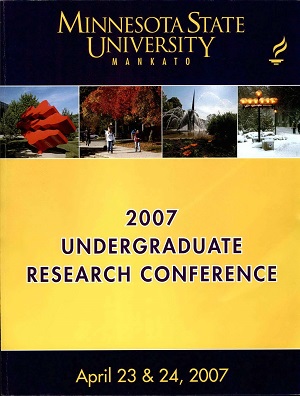Effects of Implicit vs. Explicit Encoding Instructions for a Recall Task of Brain Structures.
Location
CSU 253/4/5
Start Date
24-4-2007 10:30 AM
End Date
24-4-2007 12:30 PM
Student's Major
Psychology
Student's College
Social and Behavioral Sciences
Mentor's Name
Robert Widner
Mentor's Department
Psychology
Mentor's College
Social and Behavioral Sciences
Description
Most everyone has had the experience of a song triggering a memory of someone from their past. Such experiences, where events in the environment cue a past experience, feeling, or thought, have been cited as examples of encoding specificity. We are more likely to recall a target or desired response, if the environmental cues present at the time of study are also present at the time of test (e.g, Tulving & Thompson, 1966). Higham (2002) concluded "cued recall performance is determined by three processes: retrieval, monitoring effectiveness (i.e., the ability to discriminate correct from incorrect products of retrieval) and report bias (i.e., willingness to report an answer)". We examined the effects of instructions on encoding specificity. Participants were either informed (or not) about a subsequent memory test and were aware (or not) of learning the material. Half of the participants were tested in the same context as study and half were tested in a different context. We outline the conditions under which memory performance is optimal and discuss the implications for learning.
Effects of Implicit vs. Explicit Encoding Instructions for a Recall Task of Brain Structures.
CSU 253/4/5
Most everyone has had the experience of a song triggering a memory of someone from their past. Such experiences, where events in the environment cue a past experience, feeling, or thought, have been cited as examples of encoding specificity. We are more likely to recall a target or desired response, if the environmental cues present at the time of study are also present at the time of test (e.g, Tulving & Thompson, 1966). Higham (2002) concluded "cued recall performance is determined by three processes: retrieval, monitoring effectiveness (i.e., the ability to discriminate correct from incorrect products of retrieval) and report bias (i.e., willingness to report an answer)". We examined the effects of instructions on encoding specificity. Participants were either informed (or not) about a subsequent memory test and were aware (or not) of learning the material. Half of the participants were tested in the same context as study and half were tested in a different context. We outline the conditions under which memory performance is optimal and discuss the implications for learning.
Recommended Citation
Bomberg, Tom and Nathan Gilow. "Effects of Implicit vs. Explicit Encoding Instructions for a Recall Task of Brain Structures.." Undergraduate Research Symposium, Mankato, MN, April 24, 2007.
https://cornerstone.lib.mnsu.edu/urs/2007/poster-session-D/4




